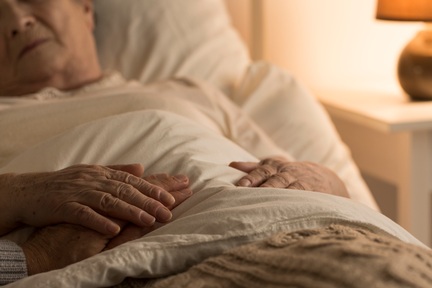Home care bosses back call for investigation into pandemic deaths at home
Home care bosses are backing a campaign for the UK COVID-19 Inquiry to investigate deaths in people’s own homes during the pandemic.

The Homecare Association, which represents over 2,300 home care bosses, is supporting Hospice UK's campaign because the Inquiry fails to take into account the rapid rise in deaths in people’s own homes during the pandemic.
Home care leader: All dying at home must get 'care they need'
The Inquiry is focused only on what happened in hospitals and care homes over the last two years but there have been over 100,000 excess deaths in private homes during the pandemic.
While many people express a preference to die at home, Hospice UK's analysis suggests almost 67,000 people who died in their homes since the pandemic's start did not get the specialist care they needed.
Dr Jane Townson, chief executive of the Homecare Association, said in a tweet: “Today we signed @hospiceuk @DyingMatters open letter, calling for the @covidinquiryuk to look at why so many people have died at home during the pandemic. We must ensure everyone who dies at home both now & in the future receives the care they need.“
Hospice UK has been raising awareness of the ‘surging numbers of people dying in their own homes’.
Dominic Carter, head of policy at Hospice UK, said: “We’ve heard stories of very poor care and quite distressing experiences. We know how hard staff have worked, and we applaud their dedication and compassion – but we believe they need better support. Mr Carter said the “right support” must be available to enable staff to help people with pain relief, symptom management etc.
Maureen Anderson’s parents both died in their living room just weeks apart in 2020. The care her parents received was described by Hospice UK as ‘poorly co-ordinated’ and ‘generated significant stress’ for Maureen Anderson and her family.
Hospice UK argues people’s home care experiences must be heard at the Inquiry alongside the experiences of families whose loved ones died in hospital and in care homes.
Over 100,000 excess deaths in private homes in pandemic
In a letter to the inquiry’s chair, Baroness Hallett, 31 charities and organisations (including the Homecare Association, Age UK and the Alzheimer’s Society as well as MPs and Peers) backed Hospice UK’s call for the Inquiry’s terms of reference to be amended.
The letter sent to Baroness Hallett stated: ‘We are writing to express our concern that the significant increase in deaths in private homes during the pandemic is missing from the draft terms of reference of the COVID-19 Public Inquiry and to make the case for its inclusion as an area of focus.’
Over 100,000 excess deaths happened in private homes across the UK since the beginning of the pandemic. Some 9-12 per cent of these deaths were directly related to COVID-19, while the majority was caused by dementia, cancer and heart disease. However, the letter warns ‘the number of deaths at home was undoubtedly accelerated by COVID-19 and people’s experiences were likely impacted by the effects of the pandemic’.
’We do not know whether people died at home by choice’
During the early 2021 lockdown, there were an average of around 1,000 excess deaths a week in England and Wales. In 2022 so far, around 4,000 people a week have died at home across the UK.
The letter stated: ‘Whilst surveys often show that most people want to die at home, this rapid shift in place of death, at a time of unprecedented pressure for the health and care system, is highly concerning.
‘We do not know whether people died at home by choice or if they stayed home out of fear of COVID-19 infection, being refused visitors in hospital, or putting pressure on the NHS.'
The letter stated: 'Government, health and care systems and frontline workers need information on what is behind this increase and how well people have been supported in order to better support those dying at home now and in the future.'
Latest News
 29-Jul-24
Dementia Bus gives carehome.co.uk staff insight into life with dementia
29-Jul-24
Dementia Bus gives carehome.co.uk staff insight into life with dementia
 27-Jul-23
UK's top home care agencies in 2023 revealed
27-Jul-23
UK's top home care agencies in 2023 revealed
 30-Nov-22
A quarter of older people keep their falls secret from family
30-Nov-22
A quarter of older people keep their falls secret from family
 29-Nov-22
'Covid-19 has not gone away' say terminally ill
29-Nov-22
'Covid-19 has not gone away' say terminally ill
 28-Nov-22
IT consultant who received poor care opens 'compassionate' home care business
28-Nov-22
IT consultant who received poor care opens 'compassionate' home care business